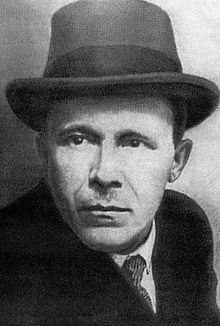Alexander Sergejewitsch Newerow
Alexander Neverov ( Russian Александр Сергеевич Неверов ; born December 12, jul. / 24. December 1886 greg. As A. S. Skobelev / Скобелев in Nowikowka , Samara Governorate (today the Ulyanovsk Oblast ); † 24. December 1923 in Moscow ) was a Russian Prose writer and playwright.
Life
His mother died early, his father, an alcoholic, soon turned his back and from the age of 15 tried his hand at various professions and began his first poetic sketches, which he showed to the poet SV Denisow. In 1903 Newerow attended a teacher training institute, where he rebelled against the prevailing religious indoctrination. During this time he wrote political and revolutionary literature for the first time. During the 1905 revolution he actively organized student protests. In 1906 Newerow became a teacher in the village of Novy Pismer . In March his first story appeared in the magazine Westnik Petersburg Tresvostj .
During his first year in Novy Pismer, Newerow protested the injustices against the peasants in various feature sections. Although he wrote under the pseudonym "Iwan Tscherwjak", his identity was determined and the author was placed under surveillance by the secret police; however, he remained unmolested. He wrote short stories about rural life and the effects of alcoholism.
In 1912 Newerow married the teacher in a neighboring village Pelageja Andrejewna Selenzowa.
When the First World War broke out, Newerow was drafted as a medic in a hospital in Samara. He continued to write; his stories fell into the hands of Maxim Gorki , who repeatedly encouraged the young writer.
Neverov enthusiastically welcomed the February Revolution of 1917 and was elected to the Samara Soviet . He wrote numerous articles on the liberation of the peasants for the newspaper Free Word (Svobodnoye Slowo), in which he basically represented social revolutionary positions (the SRP ).
From 1917 to 1918 Newerow worked as a journalist for "The Red Army", the magazine of the revolutionary war council of Samara.
In 1918 he fell ill with typhus.
In December 1918, the Kolchak troops captured Samara, which was retaken by the Red Army at the end of the year. Newerow finally decided on Bolshevism and worked for the Bolshevik newspaper Vorwärts (Vperjod).
In addition to his journalistic activities, Newerow continued to work literarily. The story of the Red Army soldier Terechin (Krasnoarmeez Terechin, 1919) describes the development of a common Red Army soldier into a progressive contemporary.
In 1920 he won first prize in a Moscow literary competition.
The story Marja die Bolschewikin (Marja - Bolschewitschka, 1921) describes the fate of a "new, liberated woman" in post-revolutionary Russia.
In 1921 the Samara region was hit by drought and famine . With many others he fled the Volga region to Tashkent . On the train journey to Tashkent he saw multitudes of hungry children begging for crumbs at every train station, and numerous dead and dying.
In May 1922 Newerow moved to Moscow, where he initially met local literary circles with a distance.
Meeting with Alexander Serafimowitsch and attending a reading of Serafimowitsch's The Iron Stream had a profound effect on Neverov.
Newerows first plant in the Moscow time, the narrative Andron scamp (Andron Neputyovii, 1922). Also in 1922 he wrote an article about the creative work of Ivan Bunin , whose works had greatly influenced him.
On May 19, 1923 Newerow completed his most famous story Taškent - gorod chlebnyj . It describes the journey of the twelve-year-old Mishka from his home village to Tashkent in the hope of finding grain for his starving family. On the way he sees faces marked by death and despair as well as Mushiks who want to throw him off the moving train. In the midst of cruelty, the boy also encounters loyalty, friendship and kindness. He eventually gets home; but most of his family is dead. But he is determined to build a new life after the tragedy.
Alexander Newerow died suddenly on December 24, 1923 of an acute asthma attack . In 1925 his work appeared under the title " Tashkent, the bread-rich city " in German translation, but in 1933 it was banned and burned by the Nazis.
Web links
- Literature by and about Alexander Sergejewitsch Newerow in the catalog of the German National Library
- sovlit.net - Encyclopedia of Soviet Writers (English)
| personal data | |
|---|---|
| SURNAME | Newerow, Alexander Sergejewitsch |
| ALTERNATIVE NAMES | Неверов, Александр Сергеевич (Russian); Neverov, Aleksandr Sergeevič (transliteration); Skobelew, Alexander Sergejewitsch (real name); Скобелев, Александр Сергеевич (real name, Russian) |
| BRIEF DESCRIPTION | Russian writer |
| DATE OF BIRTH | December 24, 1886 |
| PLACE OF BIRTH | Novikovka , Samara Governorate , Russian Empire |
| DATE OF DEATH | December 24, 1923 |
| Place of death | Moscow |
